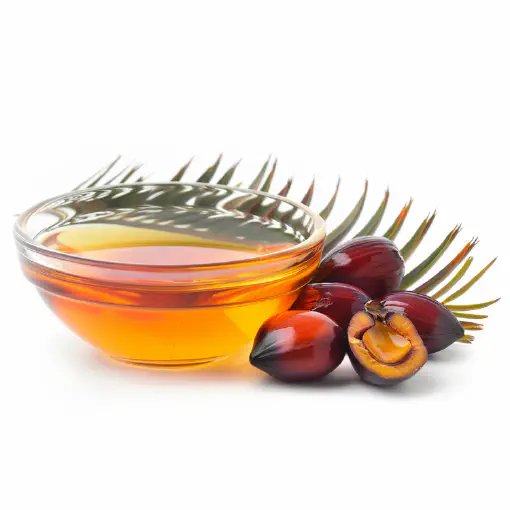Palm kernel oil is derived from the kernel of the oil palm fruit and has distinct physical properties:
Characteristics
-
Appearance:
Palm kernel oil is typically a light yellow to white solid at room temperature. However, when heated, it melts into a clear, yellowish liquid.
-
Melting point:
The melting point of palm kernel oil is higher than that of palm oil. It typically ranges from 23 to 28 degrees Celsius (73 to 82 degrees Fahrenheit). This relatively low melting point allows it to easily melt when exposed to heat.
-
Density:
The density of palm kernel oil is around 0.89-0.95 grams per milliliter, making it slightly less dense than water.
-
Viscosity:
Palm kernel oil has a relatively high viscosity, meaning it flows less freely. It is thicker and more consistent compared to some other oils. However, its viscosity decreases as the temperature increases.
-
Solidification:
At room temperature, palm kernel oil remains in a solid state due to its high saturated fat content. It solidifies into a creamy, white solid and retains its solid form even at relatively higher temperatures.
-
Odor and taste:
Palm kernel oil has a distinctive odor and taste. It is characterized by a nutty aroma and a rich, mild flavor.
-
Shelf life:
Palm kernel oil has good oxidative stability, which contributes to its relatively long shelf life. It can resist rancidity and maintain its quality over a prolonged period, making it suitable for various applications.
Note: It’s important to note that the physical features of Palm Olein may vary slightly depending on the specific source, processing method, and quality of the palm oil used in its production.
Applications
Palm Kernel Oil is widely used in various industries due to its unique properties and versatility. Here are some common industrial applications of palm kernel oil:
-
Food Industry:
Palm kernel oil is used in the food industry for a variety of purposes. It is commonly used as a cooking oil for frying and cooking due to its high heat stability. Palm kernel oil is also used as an ingredient in food products such as margarine, shortening, confectionery, bakery goods, ice cream, and chocolates. It acts as a texturizer, emulsifier, and flavor enhancer in these products.
-
Personal Care and Cosmetics:
Palm kernel oil is utilized in the production of personal care and cosmetic products such as soaps, lotions, creams, and shampoos. It is known for its moisturizing properties and ability to nourish the skin and hair. Palm kernel oil can help improve the texture, smoothness, and lathering properties of personal care products.
-
Pharmaceuticals:
Palm kernel oil is also used in the pharmaceutical industry for various purposes. It can be found in the formulation of certain medications, ointments, and suppositories. Palm kernel oil can serve as a carrier oil or an ingredient in pharmaceutical products, providing stability and aiding in the absorption of active ingredients.
-
Biofuel:
Palm kernel oil has gained attention as a feedstock for the production of biodiesel. It can be processed to produce biodiesel through transesterification, which is a renewable and environmentally friendly alternative to fossil fuels.
-
Industrial Applications:
Palm kernel oil finds usage in several industrial applications such as lubricant production, metal processing, and manufacturing of paints, inks, and coatings. Its properties, including high viscosity, lubricity, and stability, make it suitable for various industrial purposes.
Advantages of palm kernel oil over Palm oil
Palm Kernel Oil is widely used in various industries due to its unique properties and versatility. Here are some common industrial applications of palm kernel oil:
-
Higher Lauric Acid Content:
Palm kernel oil has a higher percentage of lauric acid, which is a medium-chain fatty acid. Lauric acid is known for its antimicrobial and antibacterial properties, making palm kernel oil a popular ingredient in hygiene and personal care products.
-
Solid at Room Temperature:
Unlike palm oil, palm kernel oil is solid at room temperature due to its higher saturated fat content. This solid state makes it suitable for applications where a solid fat is desired, such as in the production of shortening, margarine, and confectionery items.
-
Higher Melting Point:
Palm kernel oil has a higher melting point than palm oil. This property makes it more resistant to melting at higher temperatures, making it suitable for applications like frying and cooking, where a stable cooking oil is desired.
-
Foaming and Lathering Properties:
Due to its higher lauric acid content, palm kernel oil exhibits excellent foaming and lathering properties. This characteristic makes it ideal for use in soaps, shampoos, and other personal care products, providing a rich foam and lather.
-
More Intense Flavor:
Palm kernel oil has a more intense and distinctive flavor compared to palm oil. This makes it a preferred choice in certain culinary applications where a stronger taste is desired, such as in some traditional recipes and local cuisines.
-
Biodiesel Production:
Palm kernel oil has been found to have better characteristics for biodiesel production compared to palm oil. Its higher saturation level and lower free fatty acid (FFA) content make it more suitable for conversion into biodiesel, providing an alternative renewable fuel source.
It’s important to note that both palm kernel oil and palm oil have their own advantages and applications, and the choice between them depends on the specific requirements of each application or industry.
